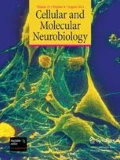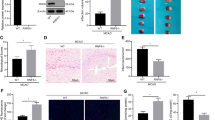Abstract
Sirtuin 3 (Sirt3) is a member of the Sirtuin family proteins and known to regulate multiple physiological processes such as metabolism and aging. As stroke is an aging-related disease, in this work, we attempt to examine the role and potential mechanism of Sirt3 in regulating ischemic stroke by using a permanent middle cerebral artery occlusion (pMCAO) model in wild type (WT) and Sirt3 knockout (KO) mice, coupled with oxygen glucose deprivation (OGD) experiments in cultured primary astrocytes. Sirt3 deficiency aggravated neuronal cell apoptosis and neurological deficits after brain ischemia. In addition, Sirt3 KO mice showed more severe blood–brain barrier (BBB) disruption and inflammatory responses compared with WT group in the acute phase. Furthermore, specific overexpression of Sirt3 in astrocytes by injecting glial fibrillary acidic protein (GFAP)::Sirt3 virus in ischemic region showed protective effect against stroke-induced damage. Mechanistically, Sirt3 could regulate vascular endothelial growth factor (VEGF) expression by inhibiting hypoxia inducible factor-1α (HIF-1α) signaling after ischemia (OGD). Our results have shown that Sirt3 plays a protective role in ischemic stroke via regulating HIF-1α/VEGF signaling in astrocytes, and reversal of the Sirt3 expression at the acute phase could be a worthy direction for stroke therapy.









Similar content being viewed by others
Abbreviations
- MCAO:
-
Middle cerebral artery occlusion
- WT:
-
Wild type
- KO:
-
Knockout
- mNSS:
-
Modified neurological severity scores
- GFAP:
-
Glial fibrillary acidic protein
- VEGF:
-
Vascular endothelial growth factor
- TUNEL:
-
TdT-mediated dUTP nick-end labeling
- HIF-1:
-
Hypoxia inducible element-1
References
Abbott NJ, Patabendige AA, Dolman DE, Yusof SR, Begley DJ (2010) Structure and function of the blood–brain barrier. Neurobiol Dis 37:13–25. https://doi.org/10.1016/j.nbd.2009.07.030
Anamika A, Khanna P, Acharjee AA, Trigun SK (2019) Mitochondrial SIRT3 and neurodegenerative brain disorders. J Chem Neuroanat 95:43–53. https://doi.org/10.1016/j.jchemneu.2017.11.009
Argaw AT, Gurfein BT, Zhang Y, Zameer A, John GR (2009) VEGF-mediated disruption of endothelial CLN-5 promotes blood–brain barrier breakdown. Proc Natl Acad Sci USA 106:1977–1982. https://doi.org/10.1073/pnas.0808698106
Argaw AT, Asp L, Zhang J, Navrazhina K, Pham T, Mariani JN, Mahase S, Dutta DJ, Seto J, Kramer EG, Ferrara N, Sofroniew MV, John GR (2012) Astrocyte-derived VEGF-A drives blood–brain barrier disruption in CNS inflammatory disease. J Clin Investig 122:2454–2468. https://doi.org/10.1172/JCI60842
Barteczek P, Li L, Ernst AS, Bohler LI, Marti HH, Kunze R (2017) Neuronal HIF-1alpha and HIF-2alpha deficiency improves neuronal survival and sensorimotor function in the early acute phase after ischemic stroke. J Cereb Blood Flow Metab 37:291–306. https://doi.org/10.1177/0271678X15624933
Borlongan CV, Rodrigues AA Jr, Oliveira MC (2012) Breaking the barrier in stroke: what should we know? A mini-review. Curr Pharm Des 18:3615–3623
Chen T, Dai SH, Li X, Luo P, Zhu J, Wang YH, Fei Z, Jiang XF (2018) Sirt1-Sirt3 axis regulates human blood–brain barrier permeability in response to ischemia. Redox Biol 14:229–236. https://doi.org/10.1016/j.redox.2017.09.016
Chow J, Ogunshola O, Fan SY, Li Y, Ment LR, Madri JA (2001) Astrocyte-derived VEGF mediates survival and tube stabilization of hypoxic brain microvascular endothelial cells in vitro. Brain Res Dev Brain Res 130:123–132
Dai SH, Chen T, Li X, Yue KY, Luo P, Yang LK, Zhu J, Wang YH, Fei Z, Jiang XF (2017) Sirt3 confers protection against neuronal ischemia by inducing autophagy: involvement of the AMPK-mTOR pathway. Free Radic Biol Med 108:345–353. https://doi.org/10.1016/j.freeradbiomed.2017.04.005
Donnan GA, Fisher M, Macleod M, Davis SM (2008) Stroke. Lancet 371:1612–1623. https://doi.org/10.1016/S0140-6736(08)60694-7
Finley LW, Carracedo A, Lee J, Souza A, Egia A, Zhang J, Teruya-Feldstein J, Moreira PI, Cardoso SM, Clish CB, Pandolfi PP, Haigis MC (2011) SIRT3 opposes reprogramming of cancer cell metabolism through HIF1alpha destabilization. Cancer Cell 19:416–428. https://doi.org/10.1016/j.ccr.2011.02.014
Hacke W, Kaste M, Bluhmki E, Brozman M, Davalos A, Guidetti D, Larrue V, Lees KR, Medeghri Z, Machnig T, Schneider D, von Kummer R, Wahlgren N, Toni D, E. Investigators (2008) Thrombolysis with alteplase 3 to 4.5 hours after acute ischemic stroke. N Engl J Med 359:1317–1329. https://doi.org/10.1056/NEJMoa0804656
Helton R, Cui J, Scheel JR, Ellison JA, Ames C, Gibson C, Blouw B, Ouyang L, Dragatsis I, Zeitlin S, Johnson RS, Lipton SA, Barlow C (2005) Brain-specific knock-out of hypoxia-inducible factor-1alpha reduces rather than increases hypoxic-ischemic damage. J Neurosci 25:4099–4107. https://doi.org/10.1523/JNEUROSCI.4555-04.2005
Jiang X, Andjelkovic AV, Zhu L, Yang T, Bennett MVL, Chen J, Keep RF, Shi Y (2017) Blood–brain barrier dysfunction and recovery after ischemic stroke. Prog Neurobiol. https://doi.org/10.1016/j.pneurobio.2017.10.001
Jin R, Liu L, Zhang S, Nanda A, Li G (2013) Role of inflammation and its mediators in acute ischemic stroke. J Cardiovasc Transl Res 6:834–851. https://doi.org/10.1007/s12265-013-9508-6
Kincaid B, Bossy-Wetzel E (2013) Forever young: SIRT3 a shield against mitochondrial meltdown, aging, and neurodegeneration. Front Aging Neurosci 5:48. https://doi.org/10.3389/fnagi.2013.00048
Koentges C, Bode C, Bugger H (2016) SIRT3 in cardiac physiology and disease. Front Cardiovasc Med 3:38. https://doi.org/10.3389/fcvm.2016.00038
Koyama T, Kume S, Koya D, Araki S, Isshiki K, Chin-Kanasaki M, Sugimoto T, Haneda M, Sugaya T, Kashiwagi A, Maegawa H, Uzu T (2011) SIRT3 attenuates palmitate-induced ROS production and inflammation in proximal tubular cells. Free Radic Biol Med 51:1258–1267. https://doi.org/10.1016/j.freeradbiomed.2011.05.028
Krey L, Luhder F, Kusch K, Czech-Zechmeister B, Konnecke B, Fleming Outeiro T, Trendelenburg G (2015) Knockout of silent information regulator 2 (SIRT2) preserves neurological function after experimental stroke in mice. J Cereb Blood Flow Metab 35:2080–2088. https://doi.org/10.1038/jcbfm.2015.178
Li Y, Ma Y, Song L, Yu L, Zhang L, Zhang Y, Xing Y, Yin Y, Ma H (2018) SIRT3 deficiency exacerbates p53/Parkin-mediated mitophagy inhibition and promotes mitochondrial dysfunction: implication for aged hearts. Int J Mol Med 41:3517–3526. https://doi.org/10.3892/ijmm.2018.3555
Lindsberg PJ, Grau AJ (2003) Inflammation and infections as risk factors for ischemic stroke. Stroke 34:2518–2532. https://doi.org/10.1161/01.STR.0000089015.51603.CC
Lombard DB, Zwaans BM (2014) SIRT3: as simple as it seems? Gerontology 60:56–64. https://doi.org/10.1159/000354382
Lu Y, Wang YD, Wang XY, Chen H, Cai ZJ, Xiang MX (2016) SIRT3 in cardiovascular diseases: emerging roles and therapeutic implications. Int J Cardiol 220:700–705. https://doi.org/10.1016/j.ijcard.2016.06.236
McDonnell E, Peterson BS, Bomze HM, Hirschey MD (2015) SIRT3 regulates progression and development of diseases of aging. Trends Endocrinol Metab 26:486–492. https://doi.org/10.1016/j.tem.2015.06.001
Meng X, Tan J, Li M, Song S, Miao Y, Zhang Q (2017) Sirt1: role under the condition of ischemia/hypoxia. Cell Mol Neurobiol 37:17–28. https://doi.org/10.1007/s10571-016-0355-2
Monahan AJ, Warren M, Carvey PM (2008) Neuroinflammation and peripheral immune infiltration in Parkinson’s disease: an autoimmune hypothesis. Cell Transplant 17:363–372
Novgorodov SA, Riley CL, Keffler JA, Yu J, Kindy MS, Macklin WB, Lombard DB, Gudz TI (2016) SIRT3 deacetylates ceramide synthases: implications for mitochondrial dysfunction and brain injury. J Biol Chem 291:1957–1973. https://doi.org/10.1074/jbc.M115.668228
Quan Y, Xia L, Shao J, Yin S, Cheng CY, Xia W, Gao WQ (2015) Adjudin protects rodent cochlear hair cells against gentamicin ototoxicity via the SIRT3-ROS pathway. Sci Rep 5:8181. https://doi.org/10.1038/srep08181
Rattner A, Williams J, Nathans J (2019) Roles of HIFs and VEGF in angiogenesis in the retina and brain. J Clin Investig 130:3807–3820. https://doi.org/10.1172/JCI126655
Shao J, Liu T, Xie QR, Zhang T, Yu H, Wang B, Ying W, Mruk DD, Silvestrini B, Cheng CY, Xia W (2013) Adjudin attenuates lipopolysaccharide (LPS)- and ischemia-induced microglial activation. J Neuroimmunol 254:83–90. https://doi.org/10.1016/j.jneuroim.2012.09.012
Shen F, Su H, Fan Y, Chen Y, Zhu Y, Liu W, Young WL, Yang GY (2006) Adeno-associated viral-vector-mediated hypoxia-inducible vascular endothelial growth factor gene expression attenuates ischemic brain injury after focal cerebral ischemia in mice. Stroke 37:2601–2606. https://doi.org/10.1161/01.STR.0000240407.14765.e8
Someya S, Yu W, Hallows WC, Xu J, Vann JM, Leeuwenburgh C, Tanokura M, Denu JM, Prolla TA (2010) Sirt3 mediates reduction of oxidative damage and prevention of age-related hearing loss under caloric restriction. Cell 143:802–812. https://doi.org/10.1016/j.cell.2010.10.002
Tanno H, Nockels RP, Pitts LH, Noble LJ (1992) Breakdown of the blood–brain barrier after fluid percussive brain injury in the rat. Part 1: distribution and time course of protein extravasation. J Neurotrauma 9:21–32. https://doi.org/10.1089/neu.1992.9.21
Shao J-X, Zhang T-T, Liu T-Y, Quan Y-Z, Li F, Liu J, Yang X, Xie Q, Xia W-L (2014) Sirtuin functions in the brain: from physiological to pathological aspects. J Shanghai Jiaotong Univ (Sci) 19:651–662. https://doi.org/10.1007/s12204-014-1562-y
Wang Q, Li L, Li CY, Pei Z, Zhou M, Li N (2015) SIRT3 protects cells from hypoxia via PGC-1alpha- and MnSOD-dependent pathways. Neuroscience 286:109–121. https://doi.org/10.1016/j.neuroscience.2014.11.045
Wang H, Li W, Muhammad I, Sun X, Cui X, Cheng P, Qayum A, Zhang X (2018) Biochemical basis for the age-related sensitivity of broilers to aflatoxin B1. Toxicol Mech Methods 28:361–368. https://doi.org/10.1080/15376516.2018.1428258
Wong KS, Li H (2003) Long-term mortality and recurrent stroke risk among Chinese stroke patients with predominant intracranial atherosclerosis. Stroke 34:2361–2366. https://doi.org/10.1161/01.STR.0000089017.90037.7A
Xu H, Hertzel AV, Steen KA, Bernlohr DA (2016) Loss of fatty acid binding protein 4/aP2 reduces macrophage inflammation through activation of SIRT3. Mol Endocrinol 30:325–334. https://doi.org/10.1210/me.2015-1301
Xu L, Li Y, Zhou L, Dorfman RG, Liu L, Cai R, Jiang C, Tang D, Wang Y, Zou X, Wang L, Zhang M (2019) SIRT3 elicited an anti-Warburg effect through HIF1alpha/PDK1/PDHA1 to inhibit cholangiocarcinoma tumorigenesis. Cancer Med 8:2380–2391. https://doi.org/10.1002/cam4.2089
Yan A, Zhang T, Yang X, Shao J, Fu N, Shen F, Fu Y, Xia W (2016) Thromboxane A2 receptor antagonist SQ29548 reduces ischemic stroke-induced microglia/macrophages activation and enrichment, and ameliorates brain injury. Sci Rep 6:35885. https://doi.org/10.1038/srep35885
Yang Y, Rosenberg GA (2011) Blood–brain barrier breakdown in acute and chronic cerebrovascular disease. Stroke 42:3323–3328. https://doi.org/10.1161/STROKEAHA.110.608257
Yang F, Zhou L, Wang D, Wang Z, Huang QY (2015) Minocycline ameliorates hypoxia-induced blood–brain barrier damage by inhibition of HIF-1alpha through SIRT-3/PHD-2 degradation pathway. Neuroscience 304:250–259. https://doi.org/10.1016/j.neuroscience.2015.07.051
Yang X, Geng K, Zhang J, Zhang Y, Shao J, Xia W (2017) Sirt3 mediates the inhibitory effect of adjudin on astrocyte activation and glial scar formation following ischemic stroke. Front Pharmacol 8:943. https://doi.org/10.3389/fphar.2017.00943
Yin J, Han P, Tang Z, Liu Q, Shi J (2015) Sirtuin 3 mediates neuroprotection of ketones against ischemic stroke. J Cereb Blood Flow Metab 35:1783–1789. https://doi.org/10.1038/jcbfm.2015.123
Zhai M, Li B, Duan W, Jing L, Zhang B, Zhang M, Yu L, Liu Z, Yu B, Ren K, Gao E, Yang Y, Liang H, Jin Z, Yu S (2017) Melatonin ameliorates myocardial ischemia reperfusion injury through SIRT3-dependent regulation of oxidative stress and apoptosis. J Pineal Res. https://doi.org/10.1111/jpi.12419
Zhang T, Yang X, Liu T, Shao J, Fu N, Yan A, Geng K, Xia W (2017) Adjudin-preconditioned neural stem cells enhance neuroprotection after ischemia reperfusion in mice. Stem Cell Res Ther 8:248. https://doi.org/10.1186/s13287-017-0677-0
Acknowledgements
This study was supported by Grants from National Key Grant (2016YFC0906400), Ministry of Science and Technology (2013CB945604), National Natural Science Foundation, China (31270032), and SJTU Funding (YG2017MS52).
Author information
Authors and Affiliations
Contributions
WX conceived the project and drafted and revised the manuscript. XY designed experiments, analyzed the data, and drafted the manuscript. YZ, KG, and KY performed experiments. JS assisted in the experimental design. All authors read and approved the final manuscript.
Corresponding author
Ethics declarations
Conflict of interest
The authors declare that they have no potential competing interests.
Ethical Approval
Animal procedures were performed according to a protocol approved by the Institutional Animal Care and Use Committee (ACUC), Shanghai Jiao Tong University, Shanghai, China. The specific protocol number approved by ACUC was 2017032.
Additional information
Publisher's Note
Springer Nature remains neutral with regard to jurisdictional claims in published maps and institutional affiliations.
Electronic supplementary material
Rights and permissions
About this article
Cite this article
Yang, X., Zhang, Y., Geng, K. et al. Sirt3 Protects Against Ischemic Stroke Injury by Regulating HIF-1α/VEGF Signaling and Blood–Brain Barrier Integrity. Cell Mol Neurobiol 41, 1203–1215 (2021). https://doi.org/10.1007/s10571-020-00889-0
Received:
Accepted:
Published:
Issue Date:
DOI: https://doi.org/10.1007/s10571-020-00889-0





